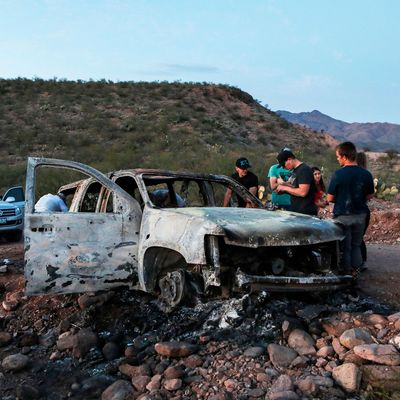
Nine women and children, all with dual U.S.–Mexico citizenship, were brutally murdered in northern Mexico on Monday in the worst attack on Americans there in years. The harrowing act of violence will have significant implications for U.S.–Mexico relations, as well as presidential campaign politics throughout the coming year.
The victims, members of an independent Mormon community in northern Mexico, were traveling in three SUVs near the border between the states of Chihuahua and Sonora when they were ambushed by gunmen likely linked to one of Mexico’s notorious drug cartels. The attackers riddled the cars with bullets and set one on fire with a mother and her four children inside. Altogether, four boys, two girls, and three women were killed. Five other children were injured, one critically. Some of the children managed to flee the attack and hid in the bushes while one 13-year-old boy walked six hours back to the Mormon enclave of La Mora to get help, according to accounts from the victims’ families.
Mexican officials believe the attack was potentially linked to an ongoing fight between La Linea and Los Salazar, local factions of the powerful Juarez and Sinaloa cartels, and may have been a case of mistaken identity, with gunmen from La Linea mistaking the victims’ SUVs for similar vehicles used by their rivals. Relatives of the victims, however, believe they were targeted deliberately, telling Reuters that the Mormon community in La Mora was well-known locally and that one of the families had previously been in conflict with drug traffickers in Chihuahua.
Monday’s attack brought Mexico’s scourge of drug violence closer to home for Americans and is already adding fuel to the debate over how to respond to that violence and prevent it from spilling over the U.S.–Mexico border. President Donald Trump tweeted in the aftermath: “This is the time for Mexico, with the help of the United States, to wage WAR on the drug cartels and wipe them off the face of the earth.” He spoke later on the phone with Mexican president Andrés Manuel López Obrador.
López Obrador, however, publicly rejected Trump’s suggestion that Mexico revert to a war footing against the cartels, noting that the country’s war-on-drugs approach had failed disastrously in the past. Since assuming office last December, López Obrador has taken steps to improve security and fight cartel violence, including by establishing a 70,000-member National Guard. His cooperation with the U.S. on border security has won him praise from Trump, but his policies have so far failed to stem the tide of violence: Mexico’s homicide rate has continued to rise and is expected to set a record this year. (Perhaps ironically, the national guard may be doing a poor job at reducing homicides because so many of its members are being deployed on border patrol duty instead.)
In the current political environment, Trump’s offer of military assistance may soon become the kind of offer you can’t refuse. With impeachment hearings afoot and a tough reelection campaign looming, the president could use a chance to talk about something else — especially an issue like immigration and border security, on which he can plausibly claim to have kept his promises to his base. Sending U.S. soldiers to fight in Mexico’s drug war, even if it failed, would highlight Trump’s self-image as the only American leader willing to do what’s necessary to protect the country. If López Obrador refuses Trump’s request to step in and help clean up the cartels, well, we’ve seen how Trump deals with foreign governments that resist his demands.
If nothing else, this attack is a reminder of how large Mexico and its internal problems loom in U.S. domestic politics, both in legitimate concerns over drugs, gangs, and border security, and in right-wing fantasies of infiltration, cultural dilution, and white genocide. We can expect this horrible story to come up in Trump’s rally speeches in the coming year, by way of describing just what kind of people those radical left Democrats want to let into the country by opening the border. Never mind that the cartels can tunnel under Trump’s wall (if not cut right through it) and that the people he is really keeping out are vulnerable Mexicans and Central Americans trying to flee the violence.
Mexican officials also pointed out on Wednesday that the bullets recovered from the crime scene were American-made Remington .223 caliber ammunition typically used in M-16 and AR-15 rifles, which the cartels can convert into fully automatic assault rifles. Indeed, the public security secretary noted that 70 percent of all the weapons tied to a crime in Mexico were smuggled from the U.S. — the most immediate example of how the American gun industry fuels violence abroad as well as at home. It seems unlikely that this event will spark any soul-searching about how our national pastime of collecting private arsenals incidentally helps arm Mexican drug gangs, but it could be an opportunity to bring this dimension of our gun-violence problem into the national conversation.
In the Democratic debates so far, the discussion of the Mexican border has mostly focused on ending Trump’s asylum-seeker detention camp system and whether the U.S. should decriminalize unauthorized border crossings. The candidate who wins the primary, however, won’t be able to sidestep the question of how to help Mexico combat the cartels and prevent this violence from spilling over the border. Nor will they be able to wave away Trump’s inevitable claim that decriminalizing illegal immigration would just make it easier for Mexican gangsters and drug traffickers to set up shop north of the border. The border remains a keystone in Republican efforts to paint Democrats as weak on national security, so the Democrats had better be ready to respond.





























